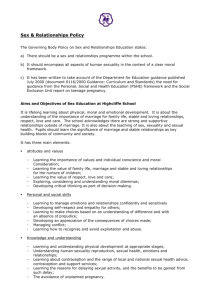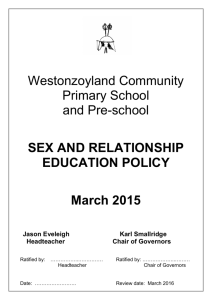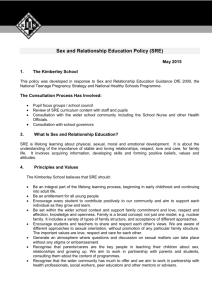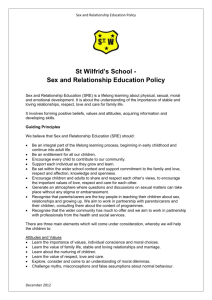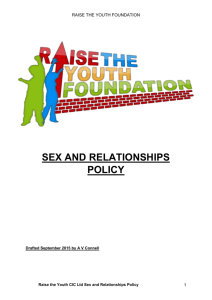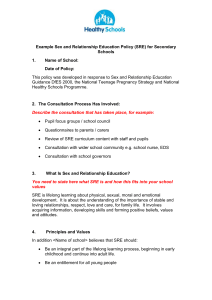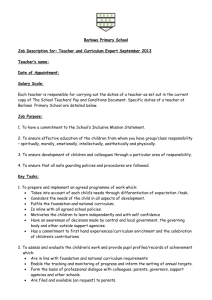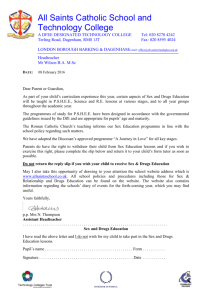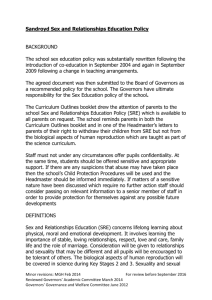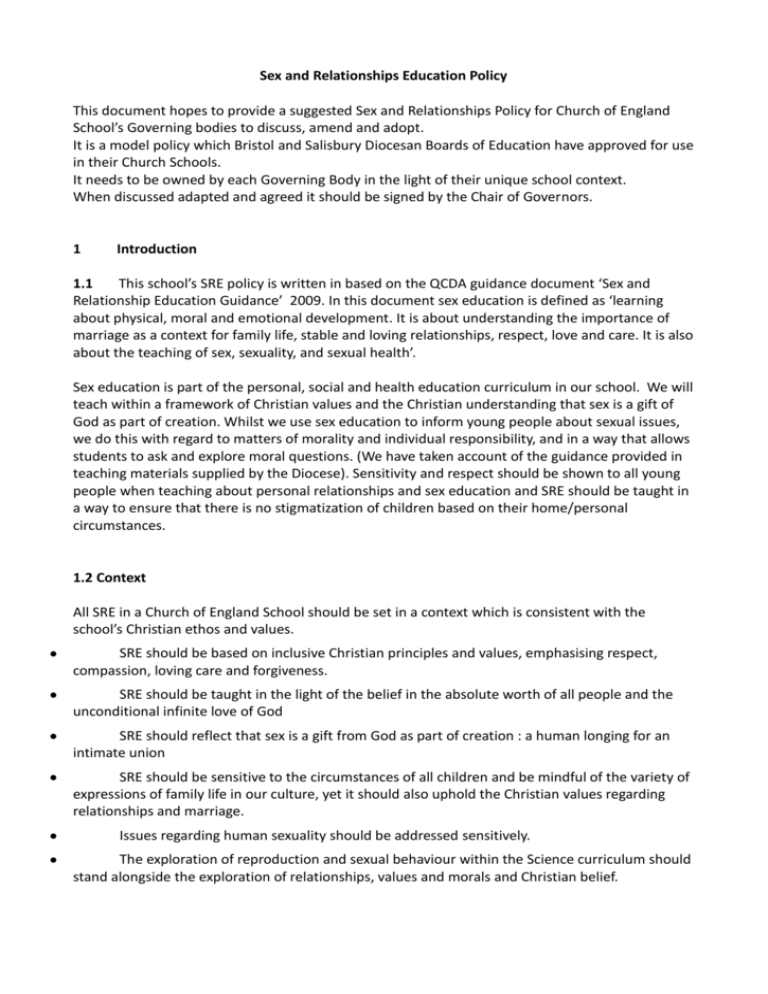
Sex and Relationships Education Policy
This document hopes to provide a suggested Sex and Relationships Policy for Church of England
School’s Governing bodies to discuss, amend and adopt.
It is a model policy which Bristol and Salisbury Diocesan Boards of Education have approved for use
in their Church Schools.
It needs to be owned by each Governing Body in the light of their unique school context.
When discussed adapted and agreed it should be signed by the Chair of Governors.
1
Introduction
1.1
This school’s SRE policy is written in based on the QCDA guidance document ‘Sex and
Relationship Education Guidance’ 2009. In this document sex education is defined as ‘learning
about physical, moral and emotional development. It is about understanding the importance of
marriage as a context for family life, stable and loving relationships, respect, love and care. It is also
about the teaching of sex, sexuality, and sexual health’.
Sex education is part of the personal, social and health education curriculum in our school. We will
teach within a framework of Christian values and the Christian understanding that sex is a gift of
God as part of creation. Whilst we use sex education to inform young people about sexual issues,
we do this with regard to matters of morality and individual responsibility, and in a way that allows
students to ask and explore moral questions. (We have taken account of the guidance provided in
teaching materials supplied by the Diocese). Sensitivity and respect should be shown to all young
people when teaching about personal relationships and sex education and SRE should be taught in
a way to ensure that there is no stigmatization of children based on their home/personal
circumstances.
1.2 Context
All SRE in a Church of England School should be set in a context which is consistent with the
school’s Christian ethos and values.
SRE should be based on inclusive Christian principles and values, emphasising respect,
compassion, loving care and forgiveness.
SRE should be taught in the light of the belief in the absolute worth of all people and the
unconditional infinite love of God
SRE should reflect that sex is a gift from God as part of creation : a human longing for an
intimate union
SRE should be sensitive to the circumstances of all children and be mindful of the variety of
expressions of family life in our culture, yet it should also uphold the Christian values regarding
relationships and marriage.
Issues regarding human sexuality should be addressed sensitively.
The exploration of reproduction and sexual behaviour within the Science curriculum should
stand alongside the exploration of relationships, values and morals and Christian belief.
Whilst students are given the opportunity to explore their own attitudes, values and beliefs and to
develop an individual moral code that will guide their actions, this is exercised within an
understanding of the right of people to hold their own views within a framework of respect for
others.
2
Aims and objectives
2.1
We teach children about:
the physical development of their bodies as they grow into adults;
the way humans reproduce;
respect for their own bodies and the importance of sexual activity as part of a committed,
long-term, and loving relationship;
the importance of marriage and family life;
moral questions;
relationship issues;
respect for the views of other people;
what they should do if they are worried about any sexual matters.
3
Principles
SRE should be based on the following principles:
The sanctity of marriage is an important belief in Christian teaching and practice.
Young people should learn the significance of marriage and families as key building blocks
of community and society.
Sex education includes learning about physical and emotional development.
Young people will be taught the cultural and religious differences about matters of
sexuality.
Sex education is part of a wider social, personal, spiritual and moral education process.
Young people should be made aware of the way in which advertising and the media
influences their views about sexuality.
Young people should be made more aware of the spiritual dimensions and joys of intimacy.
Young people should be taught to have respect for their own and other people's bodies.
Young people should learn about their responsibilities to others, and be aware of the
consequences of sexual activity.
Young people should learn that some people choose not to engage in sexual activity and
that this should be respected and valued as a response to the gift of faith.
Young people should be taught to understand the power of sexual desire.
Young people should be made aware that sex can be used compulsively, competitively and
destructively.
Young people need to learn the importance of protecting themselves and of self control.
Young people should be made aware of God’s forgiveness and that there is always a way
back.
It is important to build positive relationships with others, involving trust and respect.
Young people need to learn how to keep themselves safe when using the internet and other
forms of technology.
Young people need to be aware of responsible use of all forms of technology in order to
respect the wellbeing and integrity of others
4
The National Healthy School Standard
We now participate in the National Healthy School Standard scheme, which promotes health
education. As participants in this scheme we:
5
consult with parents on all matters of health education policy;
train all our teachers to teach sex education;
listen to the views of the young people in our school regarding sex education;
look positively at any local initiatives that support us in providing the best sex education
teaching programme that we can devise.
Organisation
5.1
We teach sex education through different aspects of the curriculum. While we carry out the
main sex education teaching in our personal, social and health education (PSHE) curriculum, we
also teach some sex education through other subject areas (for example, science and PE, RE),
where we feel that they contribute significantly to a young person's knowledge and understanding
of his or her own body, and how it is changing and developing.
5.2
In PSHE we teach young people about relationships, and we encourage young people to
discuss issues. We teach about puberty, what sex is , who it is for and the best contexts for
intimacy, contraception , sexually transmitted infections HIV and how to avoid life limiting sexual
choices. In PSHE we also teach about marriage and long term stable relationships , reflecting on
the variety of religious and cultural views held by people about these issues.
In science lessons teachers inform young people about the human reproductive cycle, conception,
pregnancy, foetal development and how that can be affected by diet drugs and disease . For this
aspect of the school’s teaching, we follow the guidance material in the national scheme of work for
science.
6
The role of parents
6.1
The school is well aware that the primary role in young people's sex education lies with
parents and carers. We wish to build a positive and supportive relationship with the parents of
children at our school through mutual understanding, trust and co-operation. In promoting this
objective we:
inform parents about the school’s sex education policy and practice;
answer any questions that parents may have about the sex education of their young person;
take seriously any issue that parents raise with teachers or governors about this policy or the
arrangements for sex education in the school;
Inform parents about the teaching about sex education in school so that the parents and school
can work together to support the young person with regard to sex education. We believe that,
through this mutual exchange of knowledge and information, young people will benefit from being
given consistent messages about their increasing responsibilities.
6.2
Parents have the right to withdraw their daughter or son from all or part of the sex
education programme that we teach in our school. If a parent wishes their child to be withdrawn
from sex education lessons, they should discuss this with the headteacher, and make it clear which
aspects of the programme they do not wish their child to participate in. The school always
complies with the wishes of parents in this regard.
7
The role of other members of the community
7.1
We encourage other valued members of the community to work with us to provide advice
and support to the young people with regard to health education. In particular, members of the
Local Health Authority, such as the school nurse and other health professionals, give us valuable
support with our sex education programme. Other people that we call on include local clergy,
social workers and youth workers.
8
Confidentiality and Safeguarding Children Procedures
8.1
Teachers conduct sex education lessons in a sensitive manner and in confidence. However,
if a young person makes a reference to being involved, or likely to be involved in sexual
activity, then the teacher will take the matter seriously and deal with it as a matter of child
protection. (This may be a matter careful discernment if the disclosure reveals peer sexual
activity).
Teachers will respond in a similar way if a child indicates that they may have been a victim
of abuse.
If the teacher has concerns, they will draw their concerns to the attention of the designated
teacher for child protection and safeguarding
The headteacher will then deal with the matter in consultation with health care professionals.(See
also Child Protection Policy.)
Advice for teachers on particularly sensitive issues such as female circumcision can be found at:
http://www.teachernet.gov.uk/wholeschool/familyandcommunity/childprotection
9
The role of the headteacher
9.1
It is the responsibility of the headteacher to ensure that both staff and parents are
informed about our sex education policy, and that the policy is implemented effectively. It is also
the Headteacher's responsibility to ensure that members of staff are given sufficient training, so
that they can teach effectively and handle any difficult issues with sensitivity.
9.2
The headteacher liaises with external agencies regarding the school sex education
programme, and ensures that all adults who work with children on these issues are aware of the
school policy, and that they work within this framework.
9.3
The headteacher monitors this policy on a regular basis and reports to governors, when
requested, on the effectiveness of the policy.
10.1
Monitoring and review
The Curriculum Committee of the governing body monitors our sex education policy on an annual
basis. This committee reports its findings and recommendations to the full governing body, as
necessary, if the policy needs modification. The Curriculum Committee gives serious consideration
to any comments from parents about the sex education programme, and makes a record of all such
comments. Governors require the headteacher to keep a written record, giving details of the
content and delivery of the sex education programme that we teach in our school. Governors
should scrutinise materials to check they are in accordance with the school’s ethos.
The SRE Policy has clear links with other school policies aimed at promoting pupils’ spiritual, moral,
social and cultural development, including the:
Equal Opportunities Policy
Health and Safety Policy
Inclusion Policy
Special Educational Needs Policy
Drugs Education Policy
PSHE & Citizenship Policy
Behaviour Policy
Anti –Bullying Policy
Safeguarding /Child Protection Policy
ICT Policy and Safe Internet Use Policy
Confidentiality Policy
Signed:
Date:

